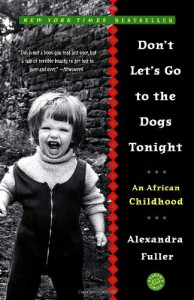Perrin Pring
I'm a sci-fi writer and reader, although, let's be honest - I'll read just about anything that moves me, regardless of the genre.
Don't Let's Go to the Dogs Tonight

Recommended to me by two people, I finally picked this book up from a thrift store. Once I started it, I found it hard to put down.
I'm just going to tell you now though, this is not the light pick-me-up read you may need as we near the dead of winter. Children and animals die. I'm not even going to separate that into a spoiler passage because such warnings should come standard with every book, in my opinion.
That said, this book opened my eyes to a world I'd never considered. I've never been to Africa, and I've not known many people who have spent a significant amount of time there. What I found most interesting about this book was its point of view. Fuller is the daughter of white settlers in (mostly) Rhodesia during the Rhodesian Bush Wars. She isn't the daughter of missionaries, and she's not the daughter of the local people. She's the daughter of the people who lost the war - the oppressors. She makes no excuses for the attitudes she and her family held, and just tells it as it is. It's a refreshing outlook, obviously not re-painted to make her family seem like the non-racist exception during the times. While some of the opinions and events that happened are shocking, she doesn't sugar coat them, and I can respect that.
Fuller's childhood will make your head spin. In the book there's a picture of her as a little girl wearing a white dress and holding an Uzi. She learned how to give IV's and patch bullet holes before she was ten. She was one of two out of five children to survive in her family, and as a child, she had a very legitimate fear of being killed by terrorists and then having her eyelids cut off. The book doesn't seem real, but it is, and it's important to remember that.
In college I took a class that focused on women writers out of Africa. I read a lot of books by the first African women to publish from various African nations. I often found the books hard to follow and to relate to because I now see I had no understanding of such a world. While Fuller's experience is wildly different than those of the women of African decent, I was able to see Africa through I lens with which I am more familiar (one tinged by Western culture). While Fuller does not, nor does she claim to, speak for the local Africans of her childhood, she introduces us to how difficult life was (and probably can still be) for local people of those countries. Fuller acts as a guide in this sense, showing us a peek at a world that most Western people do not understand because we have no context to.
I recommend this book, but only if you are willing to take on some heavy material.
 1
1


